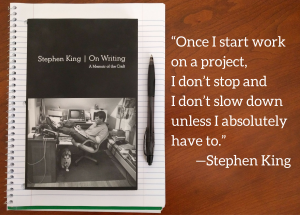 I’ve never read Stephen King’s novels. I don’t like scary stories—books, movies, campfire tales. But his book On Writing: A Memoir of the Craft is a classic if you’re looking for writing advice.
I’ve never read Stephen King’s novels. I don’t like scary stories—books, movies, campfire tales. But his book On Writing: A Memoir of the Craft is a classic if you’re looking for writing advice.
What can a business person trying to write a nonfiction book learn from the king of horror? A lot, it turns out.
For most of my clients, writing a book is a secondary activity to their primary gig, usually consulting, coaching, or speaking. I regularly see clients struggle with the writing process, unsure how to manage the shear effort of getting the words on the page.
King offers writing advice applicable to anyone’s writing process—some of it for familiar reasons, and some of it for reasons that may surprise you.
Write Every Day
“Once I start work on a project, I don’t stop and I don’t slow down unless I absolutely have to. If I don’t write every day, the characters begin to stale off in my mind—they begin to seem like characters instead of real people. The tale’s narrative cutting edge starts to rust and I begin to lose my hold on the story’s plot and pace. Worst of all, the excitement of spinning something new begins to fade. The work starts to feel like work, and for most writers that is the smooch of death.” Aha!
This might be the most important piece of writing advice ever: The more regularly you write, the easier it becomes—and stays.
Set a Daily Writing Goal
King writes 2000 words per day and completes it regardless of the time it takes. Alternatively, you could set a time-based goal (one hour per day), regardless of word count. The point is, professionals set goals and measure their progress.
Bit by bit…
Get Your Book Done in Three Months
At 2000 words per day for 90 days, King’s right—three months yields quite a decent length novel. His rationale is key: If you take longer than three months, you get tired of it. Aha!
And you know what? You don’t need to write a 100,000-word novel. Many business ebooks are in the 30,000-word range. Print books tend to be longer, but the 50,000- to 70,000-word range is still significantly shorter than 100,000.
Do the math. Say you want to start with a 30,000-word book. Let’s say you write five days a week for three months, for a total of 60 writing days. That’s only 500 words per day, which is shorter than this blog post. Manageable? (Yes, yes, of course that’s just the first draft, but for many people, the first draft is the hardest part!)
If you increase the wordcount to 750 words per day (that’s about the length of this post), the first draft is done in two months (leaving the third for revisions…)!
Eliminate Distractions
Close the door, close the blinds, and (I’m sure King would add) turn off email and social media. We’ve all heard this advice, but have you heard a reason other than “in order to focus”?
How about this rationale: Get rid of the mundane world so you can create your own. Aha!
Perhaps that sounds like advice for novelists rather than business writers. But consider this: Articulating your own ideas and concepts is comparable to creating your own world. Blocking out other voices helps you hear your own voice and develop your own concepts, free from too much influence from others.
Write the First Draft with the Door Closed and the Second with the Door Open
Close the figurative door as well as the literal. In other words, don’t share your draft too soon. Avoid getting distracted by others’ opinions or questions about what you’ve written before you’re done writing.
Responding to someone else’s ideas of what your book should be is likely to send you down the wrong path (such as making explanations) rather than help you get your draft on the page.
When you’ve revised enough to be comfortable that the book is “done,” go ahead and get feedback—see what a few select audience members think. (More writing advice on emergent writing.)
Rest Between Drafts
Let your first draft rest before looking at it fresh. King suggests a minimum of six weeks for novels. I’m not sure quite so long is warranted for shorter business books, but a week or two can certainly bring new perspective.
Ideally your manuscript appears vaguely alien to you upon rereading. Have you ever thought “Did I really write that? I don’t remember writing that.”
Time away from a draft plays wonderful tricks on the mind, allowing you to become a more effective editor. (More writing advice about revision.)
If you have any doubt that King’s writing advice works, just take a look at The Library, an impressive collection of his published works. Maybe one of these days I’ll make it out of his nonfiction and start exploring his fiction…

